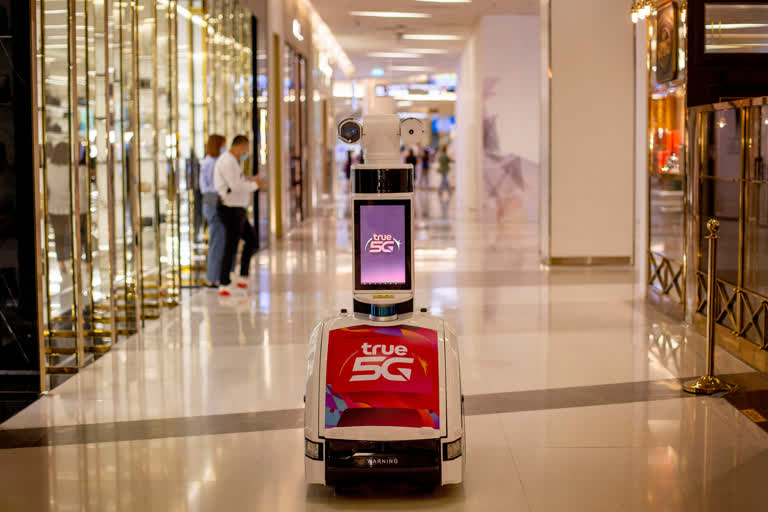Manila: Cleaning, carrying and connecting - an array of robots has been helping mankind battle the COVID-19 pandemic.
Robots are cutting costs and helping reduce the spread of infections, but some fear of growing automation is threatening jobs as unemployment soars.
Over 170 Manila students were able to attend their graduation ceremony remotely from home with the help of robots.
The robotics team of the Senator Renato Cayetano Memorial Science and Technology High School suggested assembling a robot that could represent each of the 179 students for cyber graduation.
A group of robots has been introduced at one Bangkok shopping mall, helping enforce cleaning measures to prevent the spread of COVID-19.
Thailand is in the process of reopening shopping malls, after being closed for months.
Read | Unequal access to remote learning deepening education crisis: UNICEF
Tokyo is using hotels to quarantine and treat COVID-19 patients with mild or no symptoms.
Robots are being deployed there to greet guests and clean high traffic areas to minimise the risk of human cleaners catching the virus.
A Chinese restaurant in Renesse, Netherlands is planning to use two robots to deliver orders to its customers.
The Royal Palace bought the machines before the virus pandemic hit - and in the era of social distancing, the new additions are more useful than ever.
Robots are being used in hospitals too. An Israeli hospital unveiled a high-tech simulation room, where it plans to test new, cutting-edge technology, before introducing it onto its wards.
Read | NYC calmer as Buffalo police draw ire for protester injury
Sheba Medical Center hopes its smart room will help the hospital make better choices about what new technology it adopts in the future.
A new robot could make disinfecting hospitals safer and more effective by using UV-C light to kill microorganisms.
It's hoped the technology will help fight the coronavirus pandemic as well as other illnesses spread by contact with infected surfaces.
A German supermarket is making use of new technology in the coronavirus pandemic, installing this robot to give shoppers advice on how to shop safely.
The robot, called "Pepper", stands next to the supermarket checkout in Lindlar, near Cologne, and explains to customers how to shop using social distancing measures and urges them not to bulk buy items.
Introducing Hong Kong's latest weapon in the fight against COVID-19 - this little robot has been recruited to deep-clean subway trains.
Public transport network MTR joined forces with a local biotechnology science company to deploy Vaporized Hydrogen Peroxide Robots to sterilise subway carriages.
A robot is helping keep elderly people in Hong Kong safe from the deadly virus, by allowing them to make video calls.
Visits to an elderly care centre have been restricted in the wake of COVID-19, but Temi the robot means residents can stay in touch with their relatives.
As the coronavirus pandemic makes human interactions more dangerous, retailers are turning to robots to perform essential tasks in stores.
The robots are cutting costs and helping reduce the spread of infections, but some fear growing automation is threatening retail jobs as unemployment soars and virus-induced lockdowns are forcing many retailers to permanently close their doors.
Looking a bit like an armoured personnel carrier, this robot in Russia sprays out disinfection liquid and its tank's capacity is enough to cover up to 3,000 cubic meters.
A delivery service in Colombia is taking a novel approach to limiting interactions during the coronavirus pandemic, using robots to carry out deliveries.
Delivery service Rappi and tech company Kiwibot teamed up to deploy 15 robots in the city of Medellin to get food deliveries safely to customers.
Over in Washington, it's a surprising sight to see a self-driving delivery robot full of grocery items navigating a nearby empty sidewalk and crossing intersections.
The new technology is helping restaurants and grocery stores stay open while limiting person-to-person contact during the coronavirus pandemic.
The COVID-19 pandemic has exposed the deadly consequences of fractured medical supply chains - officials hope drones will be part of the solution.
With a whir of propellers and the whoosh of a parachute opening, a fixed-wing drone dropped a box of medical supplies at Novant Health's Huntersville Medical Center near Charlotte, North Carolina.
The drop was part of a partnership between Novant and California-based Zipline.
Drones are also being used to deliver much-needed medical supplies to an island off the west coast of Scotland.
The aim is to cut down on costs and delivery times, particularly during medical crises like the ongoing coronavirus pandemic.
There's a similar project running on England's south coast, using drones to deliver medical supplies more quickly to hospitals and help ease pressure on the country's health system during the new coronavirus crisis.
The trial program was accelerated due to the COVID-19 pandemic, which saw much travel and transportation effectively shut down around the world, as authorities tried to distance people to limit contagions.
(AP)



